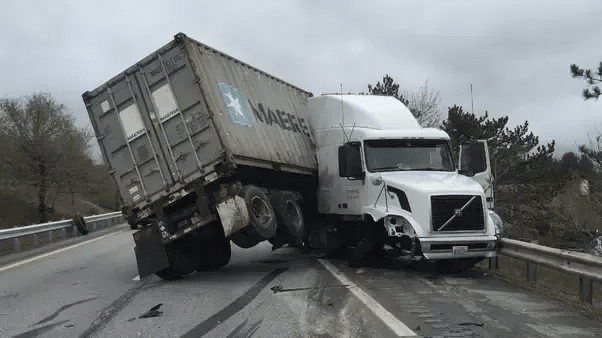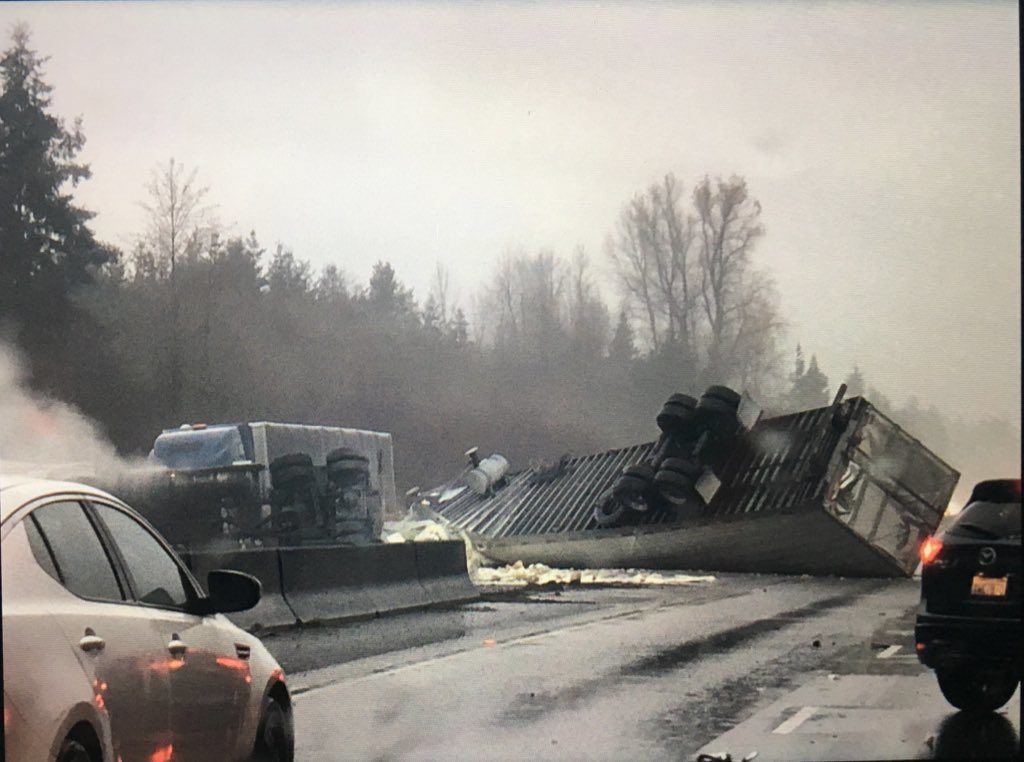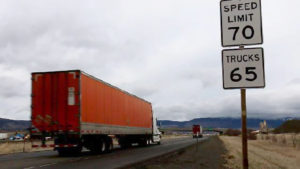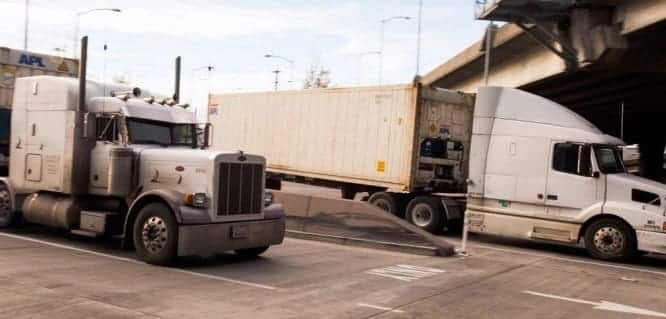During my legal career of over 30 years, I have seen and handled a countless number of jackknifed tractor trailer crash cases.
Nearly all of them have involved life altering or fatal injuries.
Big semi-trucks are a common sight on our public roads. Although they are a vital part of our transportation system, they can also be very dangerous. One of the most common types of tractor trailer crashes is called a jackknife.
Jackknife crash: when a semi-truck trailer skids towards the truck cab at a 90-degree angle.
The term comes from the look of the tractor-trailer after the crash – like a small folding knife.
Jackknife crashes may also be considered rollover crashes, although not all roll-overs end in a jackknife.
Rollover crash: when a driver loses control, and the truck slides and rolls over onto its side.
Jackknife Accidents – An Overview
Jackknife accidents, in which tractor-trailers fold like pocket knives, are highly hazardous and disruptive. Grasping the causes of these incidents and their legal nuances is crucial for all road users and industry stakeholders.
This guide covers key aspects of jackknifed tractor-trailer accidents, including fault determination, common injuries, and immediate actions after an accident.
We also explore prevention strategies and potential compensation. We discuss how a specialized truck accident attorney can assist those affected. We aim to provide essential insights to handle jackknife crashes effectively and promote safer roadways and informed legal choices.

What You Need to Know About Jackknifing?
Jackknifing is a term used to describe a specific type of accident involving tractor-trailers, where the trailer swings out and forms an acute angle with the tractor, resembling the folding mechanism of a jackknife. This often occurs under slippery conditions or sudden maneuvers.
Semi-trucks, when fully loaded, can weigh up to 40 tons or 80,000 pounds, giving them a significant weight advantage over passenger vehicles.
This substantial mass makes stopping distances longer and maneuvering more challenging, especially in emergency situations, increasing the risk of jackknifing if not handled with the utmost care.
Understanding the dynamics and risks associated with these large vehicles is crucial for both truck drivers and other road users to help prevent these dangerous incidents.
Who Can Be Held At Fault for a Jackknife Truck Accident?
Determining fault in a jackknife truck accident requires analyzing the events leading to the incident. If actions like sudden braking or improper turns were factors, the semi-truck driver may be responsible.
Liability can also extend to the trucking company for inadequate vehicle maintenance or failure to comply with safety regulations. Additionally, manufacturers might be liable if a defect in the truck or its components contributed to the accident.
Other road users could also share responsibility if their actions impacted the truck’s maneuverability. Identifying all liable parties is essential for those seeking compensation and typically involves detailed investigations and legal expertise.
Jackknife tractor trailer causes
This type of crash can be caused by a number of factors, including the following.
Excessive speed. The average tractor-trailer weighs around 80,000 pounds. The average length of a trailer is between 70 – 80 feet. It takes that vehicle much longer to stop: most trucks need 40% more time to stop compared to cars. When a truck driver is forced to stop too quickly, the trailer can slide sideways and jackknife.
Improper following distance. All too often, truck drivers do not provide an adequate following distance to allow for a safe stopping distance. When a truck driver has to slam on the brakes, the trailer can slide sideways and jackknife.
Operator fatigue. Many truck accidents crashes happen when a truck’s driver has logged too many hours behind the wheel without breaking for sufficient rest. When you’re tired, your response time suffers. If a truck driver is groggy behind the wheel, he or she may be unable to maneuver out of a dangerous situation.
Unbalanced load. A big part of safe trucking is making sure the trailer’s cargo is properly loaded and distributed. When cargo is unbalanced, it can shift, causing the trailer to tilt or tip. Unbalanced loads are often a factor in rollover crashes.
Inexperienced or untrained operator. Driving a truck is a demanding job that requires skill and experience. When truck companies try to lower costs by putting inexperienced drivers on the road, disasters can happen.
Bad weather. Jackknifes can happen when roads are slick or icy. In areas that receive very little rain, even a brief sprinkle can create hazardous road conditions, as accumulated oil can quickly grow slippery when it’s wet.
Read more about the powdered milk truck crash on I-5.
Common Injuries in a Jackknife Truck Accident?
Jackknife truck accidents are notorious for their severity, often resulting in a range of serious injuries to those involved. Here is a list of some of the most common injuries sustained in these accidents:
- Broken and Fractured Bones: The immense forces during a jackknife can easily break or fracture bones, leading to long recovery periods and potential complications.
- Neck and Back Injuries: These can include severe cases like whiplash, which are particularly common due to the abrupt motions typical of a jackknife accident.
- Internal Injuries: High-impact crashes can cause damage to internal organs, which might require immediate surgical intervention and can be life-threatening.
- Traumatic Brain Injuries (TBI): Even with the use of seatbelts and airbags, the head can suffer serious trauma, leading to TBIs that range from mild concussions to severe brain damage.
- Lacerations and Cuts: Flying debris and shattered glass can cause deep cuts and lacerations, which may result in significant blood loss or infection.
- Spinal Cord Injuries and Paralysis: These injuries can be particularly devastating, potentially resulting in partial or complete paralysis and a lifetime of disability and care needs.
Understanding these common injuries can help victims and their families recognize the seriousness of a jackknife accident and the importance of immediate medical attention.
What to Do After a Truck Jackknifing Accident
If you are involved in a jackknife truck accident, the steps you take immediately afterwards are critical for your safety and any potential legal action. Here is a guide on what to do:
- Ensure Safety: First, check yourself and any passengers for injuries. If it’s safe, move to a secure location away from traffic to avoid further accidents.
- Call Emergency Services: Dial 911 to report the accident. If there are any injuries, request medical assistance and ensure police come to the scene to file a report.
- Document the Scene: Take photos of the accident scene, including all vehicles involved, visible damage, and road conditions. This documentation can be crucial for insurance claims and legal proceedings.
- Exchange Information: Gather contact and insurance information from all drivers involved. Also, note down the contact details of any witnesses.
- Seek Medical Attention: Even if you feel fine, it’s important to be examined by a healthcare professional. Some injuries, like internal bleeding or concussions, may not be immediately apparent.
- Report the Accident to Your Insurance: Notify your insurer about the accident immediately. Provide them with the information collected, but avoid admitting fault or giving detailed statements until you’ve spoken with an attorney.
- Consult a Truck Accident Attorney: Due to the complex nature of truck accidents and the severe damages involved, consulting with an attorney specializing in truck accidents can be crucial. They can guide you through the legal process and help protect your rights.
- Follow Up on Treatments: Follow your doctor’s recommendations and keep records of all medical treatments and expenses. These documents are important for medical insurance claims and any personal injury claims.
These steps can help you manage the immediate aftermath of a jackknife truck accident and prepare for the legal and insurance processes that often follow.
How to Avoid a Jackknife Truck Accident
Preventing jackknife accidents is crucial for ensuring the safety of truck drivers and all road users. Here are some key strategies to help avoid these dangerous scenarios:
- Proper Training: Truck drivers should receive comprehensive training on safe driving techniques, especially how to handle large vehicles in various weather conditions and emergency situations.
- Regular Vehicle Maintenance: Ensure that the truck’s braking systems, tires, and other critical components are regularly inspected and maintained to prevent mechanical failures that could lead to a jackknife.
- Safe Speeds and Braking: Drivers should maintain safe speeds and use caution when braking, especially on slippery roads or in bad weather conditions. Sudden braking can cause the trailer to swing out and jackknife.
- Load Balancing: Properly balance and secure the cargo load to prevent shifts that could destabilize the trailer during maneuvers or if braking suddenly becomes necessary.
- Avoiding Distractions: Drivers should minimize distractions inside the truck cab (like using mobile phones or other electronic devices) to stay fully aware of road conditions and traffic around them.
- Using Technology: Implementing advanced driving technology such as stability control and anti-lock braking systems can help prevent situations where a jackknife might occur.
- Planning Routes: Plan routes carefully to avoid hazardous conditions or challenging roads where jackknifing risks are higher, such as steep grades or tight curves.
By following these measures, truck drivers and trucking companies can significantly reduce the risk of a jackknife accident, enhancing road safety for everyone.
Jackknife Truck Accident Compensation
Compensation for jackknife truck accidents can be significant, reflecting the severity of injuries and damages incurred. The process typically starts with filing an insurance claim against the responsible party, supported by detailed documentation of the accident, injuries, and financial losses.
If the insurance offer is inadequate or liability is contested, the case may advance to litigation. Here, evidence and arguments are presented, and a judge or jury decides the outcome.
Due to the complexities of these cases, it is crucial to have an experienced truck accident attorney who can effectively handle the legal and negotiation processes to maximize potential compensation.
How Can a Jackknife Truck Accident Attorney Can Help Me?
If you’ve been involved in a jackknifing truck accident, securing the right legal help is crucial for navigating the complexities of your claim and maximizing your compensation.
At Coluccio Law, our experienced jackknife truck accident lawyer is dedicated to advocating for your rights and ensuring you receive the justice and compensation you deserve.
Don’t wait to take action. Contact Coluccio Law today to schedule a free consultation and learn how we can assist you in recovering from your accident. Let us help you get back on track.
Research and my experience makes it clear that jackknife crashes can cause widespread damage, as they usually spread a tractor and trailer across multiple lanes of traffic. Because of this, there is the danger of secondary crashes – vehicles not initially involved in the crash, running into the tractor trailer or debris.
The Insurance Institute for Highway Safety (IIHS) shared the following statistical data from 2017:
- A total of 4,102 people died in large truck crashes.
- 17% of these deaths were truck occupants;
- 68% were occupants of cars and other passenger vehicles;
- 14% were pedestrians, bicyclists or motorcyclists.
- 52% of deaths in large truck crashes occurred on major roads other than interstates and freeways.
These statistics prove the seriousness of truck collisions and how common – and widespread – they have become. Just over the past couple weeks, I have read about several rollover truck crashes, all over the Pacific Northwest.
With the winter weather upon us, if better care is not undertaken by truck drivers, many more will occur.
Attorney Kevin Coluccio
Coluccio Law
Seattle, Washington
Learn more:
Here’s why semi-trucks jackknife …
A more extensive explanation of the factors contributing to semi-truck crashes caused by a tractor-trailer jackknife.






2 Responses
My wife was driving her truck on 11/29/19 while making a left hand turn onto an on ramp to enter the interstate she was checking her mirror’s as she always does when she seen the trailer tripping to the left thus causing her tractor and trail to land on the passenger side. She was traveling up a slit grade came to a four way intersection and showed to to make the turn as stated by several witness the same witness that helped her from the cab of the truck. The officer cited her , and she was fired from her job. I have pic of the truck drove to pick her up seen the accident location and nothing screams that she was driving at an unsafe rate of speed. The recovery team that took care of the accident stated that about a month ago a truck from the same company coming from the same pick up location with around the same amount of weight of 43 thousand pound rolled in the same location. The recovery team also stated that the have about 6 to 8 roll overs in the location a year that is about one a month. This is telling me that all these drivers are not driving at a safe speed , I think not. The trailer was sealed upon pick up so she had no idea how the load was placed or if the load was secured correctly. I feel that the load shifted due to improper loading and securement thus causing the rollover , and the responding officer and trucking company did not listen to the witness , and failed to look into the way the load was loaded as stated. The could not correctly determine the load placement after the accident because at that point the load would have shifted due to the accident. I worked as a paid First Responder as well as a volunteer firefighter and again the accident pic’s and damage does not scream out careless or reckless driving on her part.
Thanks for your comment. We have certainly seen improper loading cause or contribute to tractor-trailer crashes.